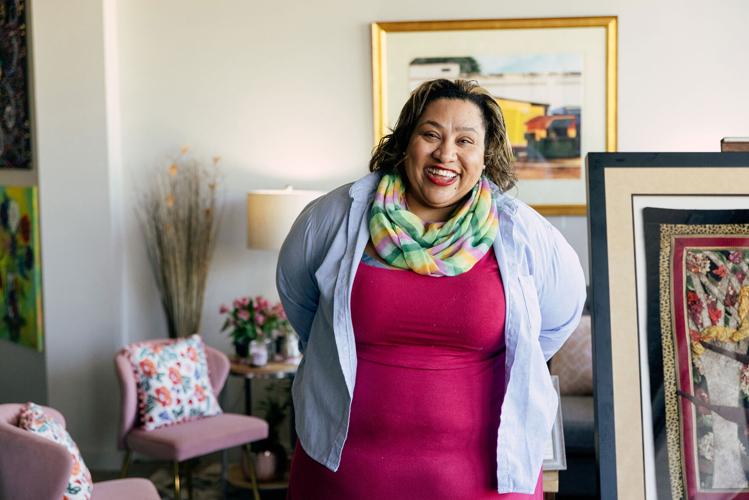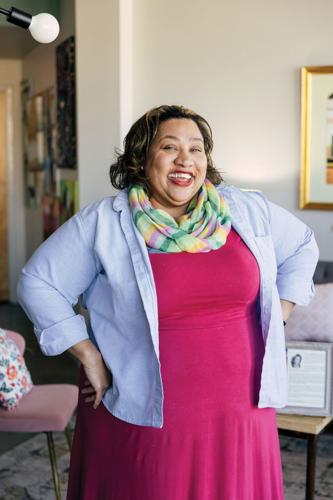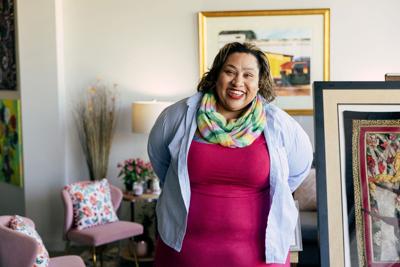In the days after George Floyd’s murder, Charlotte Miller’s white friends kept texting to ask if she was OK. “Hell no, I’m not,” she would tell them.
And then a well-intentioned bake sale popped up to raise funds for a local Black-run nonprofit. It involved the “usual suspects,” says Miller, who is Black, but it “didn’t include anyone who looked like me.” Miller adds that in 25 years as a chef, she has never worked with another Black woman chef in a manager-level position.
Angry and exasperated, Miller reached out to Nancy Vienneau, a local writer who at the time served as president of the local chapter of Les Dames d’Escoffier, a philanthropic organization of women in food, beverage and hospitality. Miller is an inaugural member of the local chapter and the organization’s first secretary. (Full disclosure: I’m a member as well.) Miller wanted to do something, but she wasn’t sure what it looked like yet.
Miller and Vienneau continued talking and emailing. As COVID raged and time passed, their plan incubated and eventually hatched.
Last month, Les Dames Nashville, led by Miller, kicked off Desegregating Nashville’s Food Scene: An Anti-Racism Brunch and Dialogue Series. In the first of three meetings, the group took on the topic Nashville’s Food History: How Race Played and Continues to Play a Role. At an event this Saturday, the topic will be Integrating Your Business: Bringing Inclusion to the Front and the Back of the House. A third event on May 21 will focus on Practicing True Hospitality: Welcoming Black and Brown People Into White Businesses and White People Into Black and Brown Businesses. The gatherings take place over Miller’s exquisite brunches at her coffee shop and event space, Yay Yay’s on Jefferson Street, which Miller opened with Jason Luntz about six months ago.
The first gathering, which rooted guests in history, featured the duo of Alice Randall and her daughter Caroline Randall Williams. The pair are a force in many endeavors — including their cookbook Soul Food Love: Healthy Recipes Inspired by One Hundred Years of Cooking in a Black Family. Randall delivered a historical and personal talk, with Randall Williams offering her brilliant, thought-provoking poetry. And they took guests beyond the usual suspects of Nashville history (i.e., hot chicken and meat-and-threes). Rather, Randall began by invoking one of the oldest African American spirituals, “Welcome Table,” which was performed by the Fisk Jubilee Singers as early as 1872 just down the road from Yay Yay’s:
I’m gonna sit at the welcome table one of these days
I’m gonna tell God how you treat me one of these days
“This is a welcome table,” Randall said of the setting. “We come together in community to consider what has been erased, who has been decentered and ways history complicates what we think we know. … Commensality, the act of eating together, is a powerful practice. Who we will eat with is a way of defining who is and who isn’t valued as a member of the community.”
Randall noted how for centuries Black and white people did not eat together in Nashville. She spoke of the many middle-class white families who employed Black folks to clean and cook for low wages and even passed off the cooking of their help as their own. “Intimate acts of culinary erasure,” she said, “that complicate contemporary moments when a Black chef presents food and is not acknowledged.”
Randall also educated the group on the important but ignored Black social and political clubs meeting around food. “Long before Nashville’s first hipster pop-up restaurant,” she said, “Black women in Music City routinely turned their homes into fine-dining establishments for a single night, for a single noon, for a single morning to serve great and political meals. Because they could not go to restaurants, they turned their home into restaurants.”
Indeed, Caroline Randall Williams’ great-grandmother, who lived not far from Yay Yay’s, had 40 place settings of silver for serving procured on a husband’s librarian salary. Randall also read a list she compiled — more than 50 clubs, some dating back more than a century into Nashville’s history — including the likes of the Jolly Seekers, Lily of the Valley Art Club, Midweek Pleasure Club, Links, We Mean Pleasure and The Vagabonds.
There are more, she said: “Some of them exist to this day. They have been ignored.” The North Pole Literary Society, for example, held a spring festival of singing and dining, but also raised money to feed 2,000 underprivileged Black children on Christmas Day in 1916.
“But the clubs were not only about service,” said Randall. “They were about the pursuit of sensual pleasure as a political act. Those feasts were about creating an occasional meal so dignified they were a cure for myriad race-based injustices. They were about being recognized as worthy to be served and being ethical enough to respect anyone serving. They were about knowing the power is serving and eating, eating and serving.”
Pulling from the pages of Black-owned newspapers, Randall shared elegant details from history, including the club colors and place cards, flowers and gold ribbon — beauty, art and bounty. “It wasn’t the only thing, but it was part of the thing,” she said. “Acts of audacious hospitality.”

Charlotte Miller
Randall Williams’ father, who grew up near Yay Yay’s, had a 13th birthday in 1972. The Ku Klux Klan burned a cross on the lawn during the party. “But that didn’t stop Grandmother Bontemps from making those place cards,” Randall said. “That didn’t stop Grandma from cooking a feast for her family.”
“These extravagances insisted with fly culinary flair that there was a place at the bounty of America’s table for Black men and Black women as surely as there is a hymn, ‘Welcome Table,’ ” Randall said. Randall called the table at Yay Yay’s an heir to the rich tradition, and Miller said the talk brought tears to her eyes. “I want to take away all the trauma tables,” Miller said. “I want to provide people joy. That’s what’s radical.”
Miller served truffled sherried eggs, shrimp and grits, roasted salmon, fruit plates and strawberry rhubarb crisp, along with food and drink she curated from sponsors such as Dozen pastry baskets and Bloomy Rind cheese platters. There were bloody mary and mimosa bars. To have folks around the bounty for discussion gave her reasons, she said, to feel productive and proud.
“I built the table for reconciliation instead of burning everything to the ground,” Miller said. “I hope that people have real conversations — that they are brave enough to look at their own behavior. And to start hiring people who don’t look like them.”
For the second half of the talk, Randall moved into the fascinating and important Nashville legacy of Black vegan and vegetarian movements, which help “shift our understanding of soul food” — a shift to what she said “Edna Lewis called soil food.”
“Why in a city with multiple Black vegan restaurants and an extraordinary connection to 19th-century Black vegetarianism is there so much writing about hot chicken and so little about bean loaves or George Washington Carver or these extraordinary Black food clubs that have been existing for so long?” asked Randall. The powerful message from both Randall and Randall Williams left the group with much to discuss. The group was left with questions like, “What does farm-to-table mean in a land of ‘Strange Fruit,’ as Caroline’s poem asked us?”
Reflecting on the day, Miller says she can’t wait for the next conversation. “And when we do a call to action, to see what people can do,” she said, “and take back to their work.”







